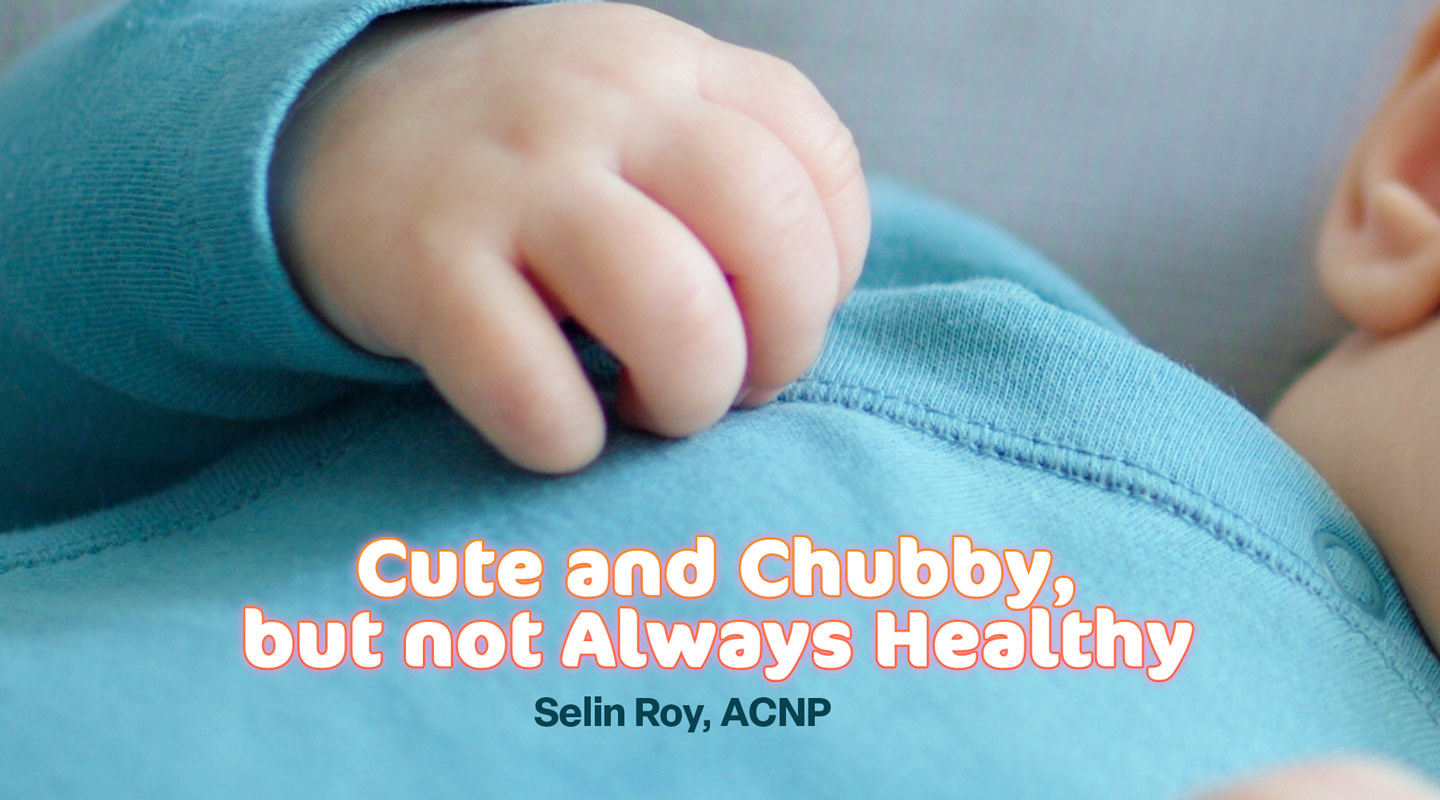Cute and Chubby, but not Always Healthy
Selin Roy, ACNP
Kids look so adorable when they are chubby, but it is not good for them in the long run. Increasing number of childhood and adolescent obesity is a public health concern in the United States and worldwide. Obesity has a tremendous impact on both physical and psychological health. It is also associated with several other conditions such as high blood pressure, high cholesterol, diabetes, sleep disturbances, poor self-esteem, and even serious forms of depression. In addition, children with obesity who were followed-up to adulthood were much more likely to suffer from cardiac and digestive disorders. The increase in body fat also exposes children to increased risk of numerous forms of cancers such as breast, colon, esophageal, kidney, and pancreatic cancers.
Is Obesity a Disease?
Yes, obesity is a chronic multifactorial disease, characterized by an excessive accumulation of adipose tissue which results from excessive food intake and/or low energy expenditure (also conveyed as not having enough exercise).
Risk Factors
Excessive caloric intake with a sedentary lifestyle is the major reason for childhood obesity. Many children have a discrepancy between what is taken in and what is expended. For example, children with obesity consume approximately 1000 calories more than what is necessary for their body to function in a healthy manner and to be able to participate in regular physical activity. Excess fat accumulates when the increase in caloric intake exceeds the total energy expenditure. Furthermore, children living in the United States today compared with children living in the 1900s are participating in more screen time, over 6 hours per day. in more than 6 hours per day of screen time. This includes but is not limited to traditional television, video games, and social media. Likewise, only 16% of children walk or bike to school today as compared to the with 42% in the late 1960s.
Health Effects
Childhood obesity is known to have a significant impact on both physical and psychological health. Poor academic performance and a lower quality of life Childhood obesity coincides with poor academic performance and a lower quality of life. experienced by the child with childhood obesity. There are many health consequences of childhood obesity, and three of the most common ones are sleep apnea, diabetes, and cardiovascular diseases. Obesity directly correlates with the severity of asthma, as well as poor response to corticosteroids. Children with obesity are more likely to become adults with obesity, thus increasing their risk for several diseases before they even reach their teen years.
Psychological Effects
High rates of mood, anxiety, somatoform, and eating disorders were detected among children with obesity. Adolescents with obesity reported significantly higher body dissatisfaction, social isolation, depression symptoms, anhedonia, and negative self-esteem than those of normal weight. There is widespread stigmatization of people with obesity that causes harm rather than the intention to motivate people to lose weight. Stigma contributes to behaviors such as binge eating, social isolation, avoidance of health care services, decreased physical activity, and increased weight gain, which worsens obesity and creates additional barriers to healthy behavior change. Weight-based bullying in youth is considered a common, serious problem in many countries.
What Should We Do to Prevent and Control Childhood Obesity?
Education of parents on proper nutrition, and dietary caloric intake requirements, and meal/snack portion sizes are forefront in prevention. Healthy eating practices should be taught by schools as a mandatory and essential method in the prevention ohf childhood obesity. Prevention and control of childhood obesity can be accomplished with the collaboration of community/school, primary health care, and home-based/family-based interventions that involve both physical activity and dietary components.

Eat the Rainbow
Having a healthy diet can help children get the nutrients they need for healthy growth and development along with and helping them reach a healthy weight. A healthy diet is rich in fruits, vegetables, whole grains, lean proteins, and low-fat or fat-free dairy. Help your kids eat the rainbow: make half of their plate fruits and vegetables for optimal health.

Move More
Compared to those who are inactive, physically active youth have stronger muscles and better cardiovascular fitness. They also typically have lower body fat and stronger bones. Regular physical activity in childhood also reduces the risk of depression. Children need at least 60 minutes of physical activity every day.

Slow Down on Sugar
Most of us eat and drink too many added sugars, which can lead to health problems such as weight gain, and obesity, type 2 diabetes, and heart disease. Children under age 2 should have no added sugar in their diet at all, and children over age 2 should keep sugars to less than 10% of their daily calories. A good way to slow down on sugar is by avoiding sugary drinks like soda, juice drinks, and flavored milk. Help your kids rethink their drink by offering water, plain low-fat milk, or 100% juice instead.

Reduce Screen Time
Adults and children spend over 7 hours a day being sedentary – and that doesn’t include time spent sleeping! Many of these sedentary hours are spent sitting or lying down with a phone, tablet, or computer; watching TV,; or playing video games (also known as screen time). Too much screen time has health consequences. It’s associated with poor sleep, weight gain, lower grades in school, and poor mental health in youth. When you reduce screen time, you free up time for family activities. The American Academy of Pediatrics recommends creating a family media plan and has examples such as keeping mealtimes tech-free, charging devices at night outside the bedroom, turning screens off an hour before bed, and many more.

Sleep Well
Good sleep is critical to prevent type 2 diabetes, obesity, injuries, poor mental health, and problems with attention and behavior. Did you know that children 6-12 years old need 9-12 hours of uninterrupted sleep a night and youth 13-18 need 8-10 hours? Too little sleep is associated with obesity partly because inadequate sleep can make us eat more and be less physically active. Help your children sleep better by making sure they’re active during the day, removing screens from their bedrooms, and setting a consistent sleep schedule, even on weekends.
Kids imitate the adults in their lives. Be a role model for them by adopting these healthy habits, and they will too! Finally, remember that obesity is a complex disease with many contributing factors.
References
National Library of Medicine. Global Pediatric health (2019)
CDC



